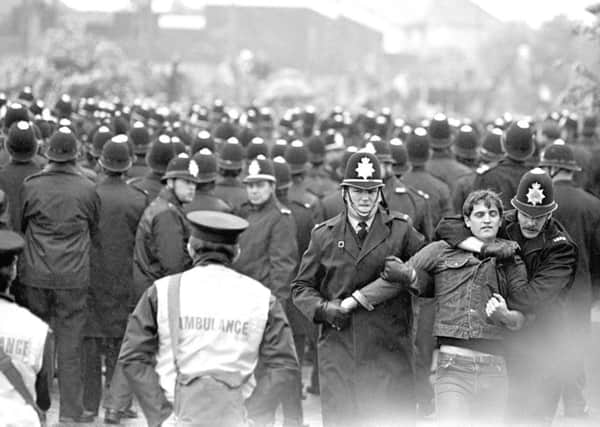Andrew Vine: Orgreave truth must come out, even if fatal for police force


His party piece in the pub after a few pints was to relate how all the overtime he’d earned had paid for new double-glazing throughout his house, and to demonstrate how grateful he was, he’d named all the windows after aspects of the strike. So there was the Scargill window, the Orgreave window, the Cortonwood window, and so on.
At which point, he laughingly raised his glass and loudly toasted the miners who were losing their jobs and in some cases their homes.
Advertisement
Hide AdAdvertisement
Hide AdFew laughed with him, because it was an utterly repellent spectacle. In common with several other people who had overheard his braying, I drank up and left, not wishing to be in the same room as this oafish braggart.
What made his boorishness impossible to stomach was spending a lot of my working life in South Yorkshire’s pit villages as the consequences of the strike unfolded in the years afterwards.
There was no laughter, still less pint glasses raised in toasts, in the coalfields around Rotherham, Doncaster and Barnsley. Instead, there was desperation and decay as livelihoods disappeared, families broke up under financial pressure and streets fell into dereliction.
The last throw of the dice for some families to stave off ruin was to put their homes up for sale, in the hope of paying off mortgages and at least trying to start again with a clean slate. Except nobody wanted to buy houses in villages with no future, and they were repossessed.
Advertisement
Hide AdAdvertisement
Hide AdThe mining communities needed somebody to blame, even though many there privately acknowledged that the strike had been a catastrophic mistake, and Margaret Thatcher was their hate figure of choice.
But running her a close second came South Yorkshire Police, which was despised with passionate intensity. And that was because of Orgreave, on June 18, 1984, when 6,000 police battled 5,000 strikers to stop them shutting down the coking plant on the outskirts of Sheffield.
The fighting shocked Britain, which watched news bulletins with something approaching horror. Mounted charges against miners who pelted officers with stones and snatch squads battering pickets looked more like a foreign revolution than a summer’s day in our own country.
The sequel was, in its way, worse. Charges of riot on allegedly fabricated evidence collapsed when they reached court. This was claimed to be a cynical attempt at a mass frame-up.
Advertisement
Hide AdAdvertisement
Hide AdTwenty-five years ago, the claims from the mining communities that the violence of Orgreave was orchestrated by the police seemed too far-fetched to believe, cries of anger from people left emotionally scarred by the economic calamity that had befallen them.
Britain didn’t want to believe them, and frankly didn’t give a damn what happened to the mining communities.
The strike had angered large parts of the population which viewed it as an attempt at class war to overturn a government which only a year before had won a resounding election victory.
The strikers’ violence was inexcusable, and if the police had administered a few kickings to maintain law and order, then good for them.
Advertisement
Hide AdAdvertisement
Hide AdBut then a different, disturbing narrative began to emerge. The testimony presented first to the Hillsborough inquiry, and then at the painstaking inquests that followed, of alleged serious misconduct by South Yorkshire Police suddenly cast the claims of the coalfield communities in a new light.
We should know soon what form the belated inquiry into Orgreave and its aftermath will take, when Home Secretary Amber Rudd announces the appointment of a senior lawyer to review the material in the case.
It cannot come soon enough, because the truth must be uncovered, just as it had to be revealed about the Hillsborough disaster, whatever the consequences for individuals or the police force they served.
Those two terrible days are so closely intertwined, the allegations of misconduct and cover-up so similar, that their combined legacy might sound the death knell for South Yorkshire Police, especially following the force’s abysmal failure over the Rotherham child sexual abuse scandal.
Advertisement
Hide AdAdvertisement
Hide AdIf it has to be disbanded and policing of South Yorkshire amalgamated into surrounding forces, then so be it.
The taint of past failures – or even misdeeds – can be enough to rob an organisation of its credibility, and diminish both the confidence and support of the public. When that happens, only a completely fresh start will do.
The Battle of Orgreave produced only losers. The miners whose livelihoods were lost and communities wrecked we have known about for decades. A police force with its reputation trashed yet again, possibly with terminal consequences, would bring the bleak consequences of that day 31 years ago into the present.
But as with Hillsborough, the only comfort for hurt and anger is to be found in the truth, however long it takes to emerge.